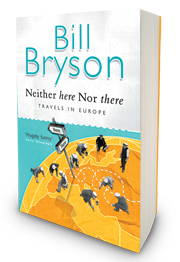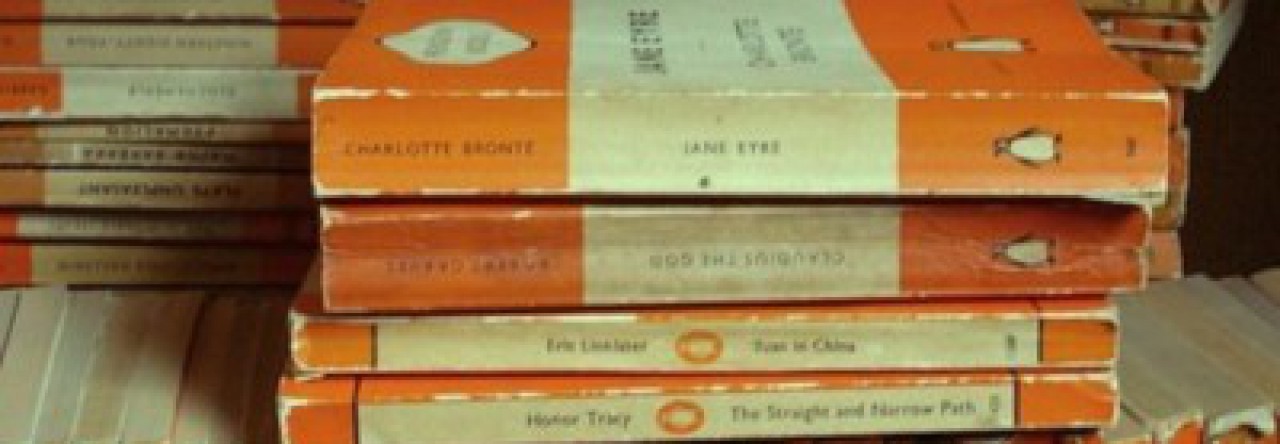 Neither Here Nor There: Travels in Europe
Neither Here Nor There: Travels in Europe
Bill Bryson
Black Swan, 1998 (1991)
Travel Writing, English, 304 pages.
This is the first Bryson’s book I read. It’s a travelogue of his backpacking across Europe, alone, following the same route he had travelled with his friend, Katz, twenty years back while they were students. He traveled to some countries and places in continental Europe, precisely from uppermost town Hammerfest in Norway, then going south to some (major) cities, before ending in Istanbul. The trip itself was done around 1990 (as I concluded from some information in the book). Bryson was born in Iowa, US, so far has been living in the US and England. So imagine with this american and anglo-saxon backdrop of mind he traveled to the small and compact continental Europe. Having grown up in vast America, “where you can go or fly miles away but still be in the same country“, as Bryson saw it, Europe (continental) had drawn some fascination for him, as how he captured below:
One of the small marvel of my first trip to Europe was the discovery that the world could be so full of variety, that there were so many different ways of doing essentially identical things, like eating and drinking and buying cinema tickets. It fascinated me that Europeans could at once be so alike — that they could be universally bookish and cerebral, and drive small cars, and live in little houses in ancient towns, and love soccer, and be relatively unmaterialistic, and law abiding, and have chilly hotel rooms and cosy and inviting places to eat and drink — and yet be so endlessly, unpredictably different from each other as well. I loved the idea that you could never be sure in Europe. (p. 40)
Full of humor and (sharp) opinions on what he saw along the way, specially on local customs, which he often found ‘amazingly weird‘ as they are very different from what he knew in America. For instance, he found that, unlike most great cities, Copenhagen is free from any delusions of self-importance; no monuments or statues of generals of a country that once ruled Scandanavia — only a little statue of mermaid. In Stockholm, despite his complains on its weather and people, he was respectfully amazed of its social security system where richness and socialism just go hand-in-hand, whilst in America, capitalism rules even decisions to public health. In terms of funny comments, he put them almost everywhere.
At first, it was an enjoyable read to see those contrasting facts wrapped in humorous remarks, but further along my reading, I began to ‘not really like it’. Funny remarks become sarcastic, even disrespectful to local’s way of doing. It seems for Bryson everything should be in or should start with ‘american way’; eg. while he saw a soldier in Sweden with kind face wearing white hat, he laughed pointing that it was ridiculous for a soldier to look like Donald Duck and compared it to american soldiers. And I started not to buy it in at all when I found that the ‘humor’ included a racial element in it; here is some bits:
It is of course hypocritical to rail against tourists when you are one yourself, but none the less you can’t escape the fact that mass tourism is ruining the very thing it wants to celebrate. And it can only get worse as the Japanese and other rich Asians become bolder travelers. When you add in the tens of millions of eastern Europeans who are free at last to go where they want, we could be looking back on the last thirty years as a golden age of travel, God help us all. (p. 199)
while, on the other hand, when he was recalling here and there the trip he was doing with Katz years back and how they disregarded the local cultures or rules, he just found it all fine and funny.
I saw that the tendency to throw snark comments goes along with the time curve of his travel. At the beginning, when he was obviously still fresh (and happy), things appeared better to him. However dull and damp the weather in the uppermost city of Hammerfest, he could still find joy in spending the day in such a gloomy and deserted environment, and so the comments just look funny, without snark remarks. But nearing the middle of his travel, when he was probably getting (much) more tired, things just looked wrong in every way. Personal faults are projected into nation-wide’s faults (like got drunk the night before, and could not get up early enough the next morning to catch the train, troubles along the way, then he complained the whole system). On contrary, when he found something so unexpectedly good, he would say sort of that it was the best thing ever happened in his life and so on, which I found too hyperbolic. Exception was when he was in Yugoslavia and Sofia. With the condition of the country so profoundly backwards, he just could not complain any further, but, he switched his attitude into analyzing the situation and I should say that his opinions here are (back to being) sharp and even a bit reflective. In Sofia, when he felt so sorry for the situation and wanted to help the people by spending his money buying their things:
I began to get obsessed with trying to spend some money, but there was nothing to spend it on, nothing. One of the parks… was full of artists selling their own work and I thought, Great! I’ll buy a picture. But they were all terrible. Most of them are technically accomplished, but the subjects were just so awful… surreal… It was as if they were so far out of touch with the world that they didn’t know what to paint. (p.296)
All in all, not a kind of travel book that I would be savoring, though it does have some enjoyable aspects in it. Maybe when I’d be in the mood of snarking everything, I would enjoy more this book.
Mei
Paris, 13 August 2010

Bill Bryson’s travel books are a permanent feature in a lot of British bookstores, unfortunately I have yet to read any one of it. I have “A short history of everything” and will read that at some point.
Travel writings are my favourite genre and like you I do not appreciate snark remarks in any country. If one is going to see hate something about the country you travel and can’t see the good side of it, why bother to travel to that country and enjoy the local’s hospitality? I think I am going to skip this one.
Perhaps you might think twice about picking Paul Theroux’s travel books too, he is just as bad, if not worse. I read one of his and I think very very hard if I want to pick up another book of his.
Great review!
‘A short history about almost everything’, I once thought it could be an interesting reading though, history of science presented probably in humorous way? (if not with too many snark jokes). I have ‘Notes from a small island’, I was interested to read about a journey across UK, but for now I think I’ll put it to a later point, waiting for the right mood. Bryson’s books do have fans, I did enjoy some parts of this one book I read, but at the end I was a bit tired reading his complains, it was not a kind of travel writing of my taste.
I’ve never read Paul Theroux’s, though knowing his name in travel writings genre (I’m now reading Peter Matthiessen’s Snow Leopard, coincidently with Theroux’s endorsement on it). Any disregard of local culture quite dissuades me from wanting to read it.
So far I love best the travel writing of Frances Mayes, ‘A year in the world’. She did the travel in a very different angle, preferring being ‘part resident’ in places she visited and from there trying to know and understand the local culture, to moving in a rush from one place to another. She could see beauties in however poor or deserted places, digging into their history and arts (might not be the taste of everybody though). No judging on places or people, at the end, let the readers decide.
Thanks for the comments!